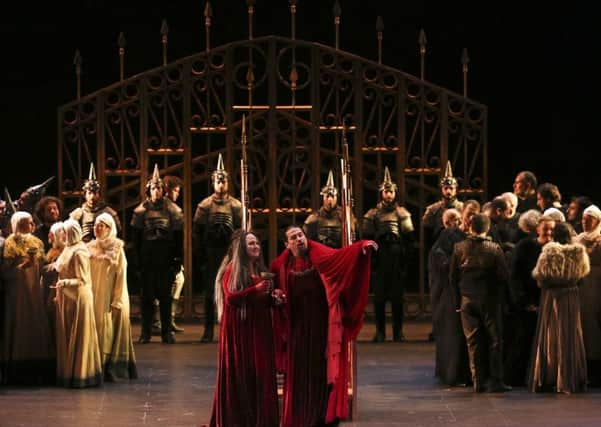Edinburgh International Festival: The spirit of 1947 plays on


And this time, the excellent Gianandrea Noseda and his Teatro Regio Torino, somehow managed to give the score an impassioned, thrilling treatment – despite what was going on on stage.
It’s hard to say what was most distracting. Perhaps it was the inexplicable pole dancers, perhaps it was the rickety railing set, perhaps it was the clichéd twitchy-witches and their frolics with “well hung satyrs” (who were, it must be said, fantastic acrobats). Or then again, perhaps it was the motorised, bloodied hospital beds that alarmingly – and hilariously, I’m afraid – acted out a distracting ballet as Anna Pirozzi hit the high notes of Lady Macbeth’s sleepwalking aria. All was acted out in the kind of Games of Thrones-y costumes that suggested the director, Emma Dante, imagined Scotland labouring in a perpetual Dark Age, a lost world of men in bear suits sweltering under dimmed stage lights.
Advertisement
Hide AdAdvertisement
Hide AdThere were, nonetheless, some decent ideas that weren’t smothered, and rare moments of visual, dramatic and musical unity, such as when the chorus exquisitely mourned their country’s downfall, “Patria Oppressa”, dressed in black, their faces just visible in the half-light at the back of the stage as cloths were laid quietly over rows of bodies in front.
Musically, it was all brilliantly done in this mix of the 1847 and revised 1864 scores, the orchestra thrillingly coloured, the singers, including Dalibor Jenis’ under-the-thumb Macbeth, in fine voice, not least Piero Pretti’s brief turn as a show-stealing Macduff.
Tuesday morning’s Queen’s Hall offering, with serene counter-tenor Iestyn Davies and the Academy of Ancient Music in a programme of Telemann and Bach, was much more urbane.
The Telemann Overture-Suite in D Major and Trio Sonata were played with wit and vigour by the Academy of Ancient Music under Richard Egarr, after which we were thoroughly admonished by Iestyn Davies’ Bach Cantatas, the “Gott soll allein mein Herze haben”, sung with incredible clarity and warmth, ably supported in the final chorale by fine young singers Emily Mitchell (soprano), Arthur Bruce (bass) and Malcolm Bennett (tenor). A superb first instalment of Davies’ two-concert Bach exploration.
The Teatro Regio continued their mini-residency in the Usher hall that evening with a thrilling performance of Verdi’s Requiem, albeit with slightly mismatched soloists, a stylistic clash that occasionally didn’t quite harmonise.
The opening chorus was ecclesiastically ethereal, the Dies Irae fabulously terrifying. Daniela Barcellona’s mezzo was exquisite in “Liber scriptus proferetur” and Noseda created a superbly-paced tapestry of sound from the fine orchestra and singers.
The following night in the Usher Hall, a hotly anticipated meeting of two orchestras – the Mariinsky and the Royal Scottish National, whose Die Walküre had been so thrilling in the first week. Mariinsky chief conductor Valery Gergiev conducted both, with the first half a pitting of the Mariinsky and Prokofiev Symphony No 1 “against” the RSNO and Britten’s Variations On A Theme Of Frank Bridge.
Advertisement
Hide AdAdvertisement
Hide AdThe Prokofiev was incisive, buoyant, the Britten decisively paced, thorough, whisper quiet where it needed it, but it was the Shostakovich Symphony No 4 which wowed, with a sound from the combined orchestras so vast, controlled and magnificent it could probably be heard up at the Castle.
The thundering climaxes, which came out of the luminous quiets or the off-kilter waltzes that Gergiev coaxed from his players, were both thrilling and terrifying.
With so many highlights in the classical and opera programmes, the sheer magnitude of this performance was a fitting orchestral tribute to both the Festival, the anniversary and the spirit of ’47.